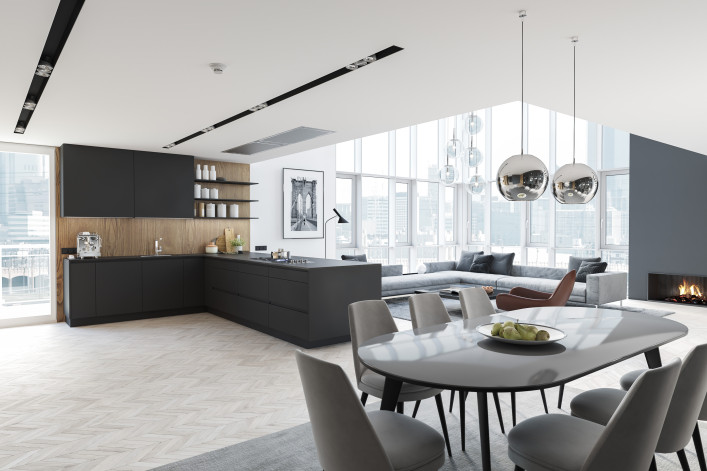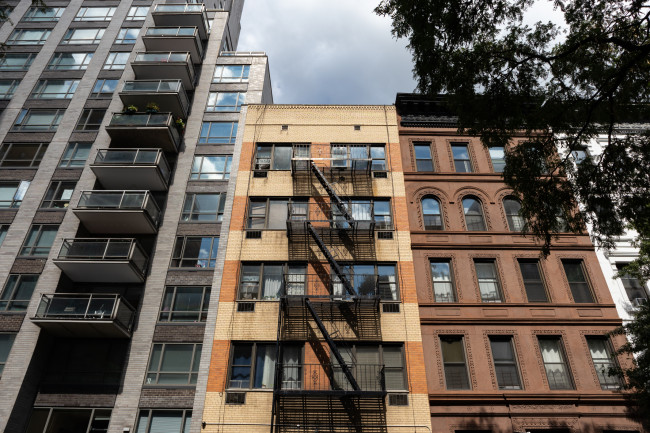7 surprising dealbreakers that might sink your NYC co-op or condo sale
- An 11th hour decision to take the living room lighting fixture will not go over well with a buyer
- Some buyers won't purchase in a building where the A/C is turned off during the winter

As a seller, be very clear at an early stage if you will plan on removing any fixtures or appliances.
2Mmedia/iStock/Getty Images Plus via Getty Images
If you are selling your New York City condo or co-op, you know that it's a tough time. Being realistic about pricing is always key when you’re selling, as is getting your apartment seen by as many qualified buyers as possible. But have you considered how your 11th hour decision to take the living room lighting fixture might sink the deal?
There are a few other unexpected issues that might derail your sale, including restrictive guest rules, the A/C being switched off in winter, or even your own ego. Brick has tips on how to identify these deal breakers and how to avoid them jinxing your deal. Hint: be honest and upfront about the unique features of your apartment or building.
1. The high-end living room chandelier
A buyer will typically assume that all the fixtures are going to be included in the sale.
"If an item is not deemed excluded in the deal sheet it is considered included," says attorney Stephen W. Allen, a partner in the residential real estate department at Romer Debbas. If the buyer then comes to the walk-through and sees the $2,500 chandelier has been replaced with an inferior fixture, this could derail a deal.
Kobi Lahav, senior managing director at Living New York, has seen this happen on a $3 million apartment deal. The sellers didn’t want to give the fixture away because of the emotional connection they had to it, but for the buyer it became a symbol of what else was being hidden from them. “It wasn't about the money,” Lahav says.
As a seller, be very clear at an early stage if you will plan on removing any fixtures or appliances.
“The fixture list needs to be done before you send out the deal sheet,” Lahav says. If you fail to do this, be prepared to say goodbye to that chandelier if you really want to deal to move forward.
2. The A/C being switched off in winter
Kimberly Jay, a broker at Compass, has worked with numerous buyers who will not purchase an apartment in a building where the A/C is turned off in the winter months.
There are many buildings where the property manager controls the heat so you can’t turn on air conditioning in the winter. Not only do some apartments with floor-to-ceiling south-facing windows get uncomfortably warm in the winter, if the A/C doesn't work during heat season, there's no way to check it is functioning ahead of the hot summer months. For sellers in these situations, you need to be transparent about this.
3. Those very restrictive guest rules
Jay has worked with both buyers and sellers in a co-op building that doesn't permit any guests when the shareholder is not present. The building allows pieds-à-terre however the board package spells out very strict guest rules.
As a seller, you should be very clear about any highly restrictive occupancy rules, such as if friends and family cannot stay over when you are out of town.
“Your agent should be informed and you should know the rules,” Jay says. This situation highlights one of the main differences between a condo and a co-op. The way a co-op is structured gives a board much more control.
4. A co-op's rules about windows
Another contentious issue is the window replacement rules. If you're selling, you should know who is responsible for window repair and replacement. Sometimes this is outlined in the proprietary lease, or bylaws or the sales package. Some buildings require an incoming shareholder to remediate the windows where necessary.
If the incoming buyer will need to replace windows, you should to be aware this issue will likely be part of the sales contract negotiations. Another alternative is to make the repairs before you sell.
5. Permit issues in combination apartments
Renovation work without permits poses safety risks, administrative headaches, and possible insurance issues. Most co-ops and condos have lots of rules about renovations, requiring you to submit alteration agreements, get a certificate of insurance, and open and close the relevant permits. Permit issues might occur in apartments that have been combined. It could come down to a negotiation between the buyer and seller about how this would be dealt with.
Jay's advice for a seller: “Fully disclose any type of unique or unusual situation that you know there’s a high probability that a buyer would not move forward on."
6. A missed notice from the managing agent
As a seller, make sure you are opening all notices from your management.
"Open every single envelope you get from your management company because, hidden in there could be something like Local Law 152 gas-pressure testing," Allen says. This local law requires gas-line tests every four years. If a leak is identified, there could be service interruptions that would affect your ability to sell the apartment with systems and appliances in working order.
Allen recently encountered this scenario where the seller was not aware gas service for the entire building would be shut down for five months to facilitate repairs, rendering the gas range in the apartment's chef's kitchen unusable.
Without gas service, the deal could go south. "If you can't get systems and appliances in working order because there is a building-wide shut off, then that's something that needs to addressed," Allen says.
7. Ego management for a successful sale
This might be a difficult one to swallow as a seller—but sometimes you need to get out of your own way. Jay recounts a sale where a buyer asked for a custom laundry basket to be included in the apartment sale. The item was not fixed in place but it matched the master suite decor. The seller, annoyed they were not getting the price they wanted, said the buyer could not have the storage piece—and the deal fell apart.
In these situations, it's worth remembering the bigger picture. "You don't want to cut your nose off to spite your face," Allen says.
You Might Also Like



























